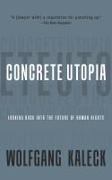Concrete Utopia
BücherAngebote / Angebote:
While this book provides a political history of the human rights project, its approach to history is a dialectical one, informed by a philosophical framework laid out early in the text. The book then provides a wide-ranging and interdisciplinary overview of the recent developments within the human rights movement, the daunting complex of interconnected global crises, as well as a current map of global resistance movements and their transformative potential. The complex relationship between law and universal human rights is also explored across this historical canvas.
The book combines theory and practice to make a case for why human rights did not exhaust their powers in the 20th century and, instead, are possibly even more suited to the looming struggles ahead. Because of its approach of combining theory and practice, the book should appeal across the spectrum to those in the fields of law, activism, art, political science, political theory, history and the humanities, as well as to those involved or interested in the human rights project in general.
By tracing legal, political, as well as artistic interventions in various case studies, the book outlines the progress that activist struggles and strategic victories in the human rights project have yielded, illuminating what these can teach us for future mobilization.
Kaleck's background as an internationally active human rights lawyer gives him insight into the role of international law, as both a progressive within the human rights project.
Erscheint im Februar



